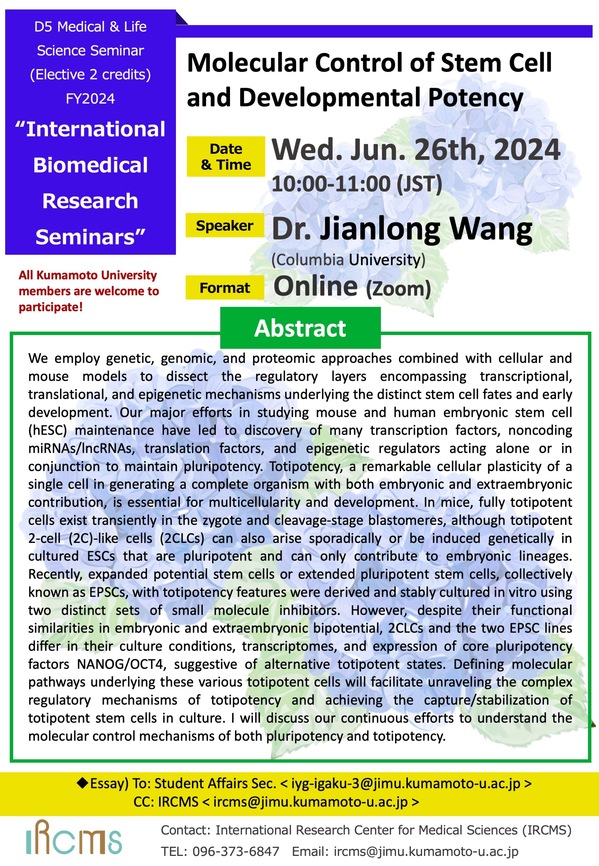- HOME
- News & Events
- [June 26] D5 Seminar- Dr. Jianlong Wang (Columbia University)
News & Events
[June 26] D5 Seminar- Dr. Jianlong Wang (Columbia University)
May 20 2024
The "D5 Medical & Life Science Seminar" course will be offered by International Research Center for Medical Sciences (IRCMS). It will run from May 2024 to March 2025, with lectures given by scientists who are affiliated with IRCMS or in collaboration with researchers at IRCMS. The lectures will be given once a month, in English, and by leading scientists in the relevant research field. Students will be taught: 1) how normal physiological functions are maintained in the human body; 2) how these systems become abnormal under certain pathophysiologic conditions; 3) why stem cells are important in animal development and homeostasis; 4) how stem cell-based approaches can help us understand disease mechanisms and find potential cure for diseases related to stem cell malfunction (e.g., cancer, aging).
Anyone who wants to join is welcome.
For students who have registered for the course, please check your attendance in Moodle.
Date : June 26th, 2024 (Wednesday)
Format : Online (Zoom)
Time : 10:00 - 11:00 (JST)
Speaker : Dr. Jianlong Wang (Columbia University)
Title : Molecular Control of Stem Cell and Developmental Potency
Abstract :
We employ genetic, genomic, and proteomic approaches combined with cellular and mouse models to dissect the regulatory layers encompassing transcriptional, translational, and epigenetic mechanisms underlying the distinct stem cell fates and early development. Our major efforts in studying mouse and human embryonic stem cell (hESC) maintenance have led to discovery of many transcription factors, noncoding miRNAs/lncRNAs, translation factors, and epigenetic regulators acting alone or in conjunction to maintain pluripotency. Totipotency, a remarkable cellular plasticity of a single cell in generating a complete organism with both embryonic and extraembryonic contribution, is essential for multicellularity and development. In mice, fully totipotent cells exist transiently in the zygote and cleavage-stage blastomeres, although totipotent 2-cell (2C)-like cells (2CLCs) can also arise sporadically or be induced genetically in cultured ESCs that are pluripotent and can only contribute to embryonic lineages. Recently, expanded potential stem cells or extended pluripotent stem cells, collectively known as EPSCs, with totipotency features were derived and stably cultured in vitro using two distinct sets of small molecule inhibitors. However, despite their functional similarities in embryonic and extraembryonic bipotential, 2CLCs and the two EPSC lines differ in their culture conditions, transcriptomes, and expression of core pluripotency factors NANOG/OCT4, suggestive of alternative totipotent states. Defining molecular pathways underlying these various totipotent cells will facilitate unraveling the complex regulatory mechanisms of totipotency and achieving the capture/stabilization of totipotent stem cells in culture. I will discuss our continuous efforts to understand the molecular control mechanisms of both pluripotency and totipotency.
References1-4
1 Costa, Y., Ding, J., Theunissen, T. W., Faiola, F., Hore, T. A., Shliaha, P. V., Fidalgo, M., Saunders, A., Lawrence, M., Dietmann, S., Das, S., Levasseur, D. N., Li, Z., Xu, M., Reik, W., Silva, J. C. & Wang, J. NANOG-dependent function of TET1 and TET2 in establishment of pluripotency. Nature 495, 370-374, doi:10.1038/nature11925 (2013). PMC3606645.
2 Yang, F., Huang, X., Zang, R., Chen, J., Fidalgo, M., Sanchez-Priego, C., Yang, J., Caichen, A., Ma, F., Macfarlan, T., Wang, H., Gao, S., Zhou, H. & Wang, J. DUX-miR-344-ZMYM2-Mediated Activation of MERVL LTRs Induces a Totipotent 2C-like State. Cell Stem Cell 26, 234-250 e237, doi:10.1016/j.stem.2020.01.004 (2020). PMC8074926.
3 Li, D., Yang, J., Huang, X., Zhou, H. & Wang, J. eIF4A2 targets developmental potency and histone H3.3 transcripts for translational control of stem cell pluripotency. Science advances 8, eabm0478, doi:10.1126/sciadv.abm0478 (2022). PMC8967233.
4 Huang, X., Balmer, S., Lyu, C., Xiang, Y., Malik, V., Wang, H., Zhang, Y., Cai, B., Xie, W., Hadjantonakis, A. K., Zhou, H. & Wang, J. ZFP281 controls transcriptional and epigenetic changes promoting mouse pluripotent state transitions via DNMT3 and TET1. Dev Cell 59, 465-481 e466, doi:10.1016/j.devcel.2023.12.018 (2024). PMC10923053.
Flyer: (Click to enlarge)

